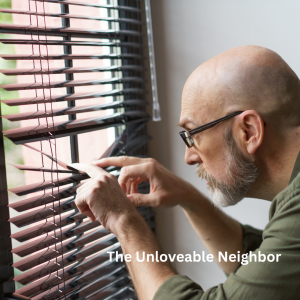Answering the question of how to love unlovable neighbors requires a bit of exploration. The insights came when the Pharisees tried to outsmart the Sadducees, who had been silenced by Jesus’ wisdom. They asked, “Teacher, which is the greatest commandment in the Torah?”
During Jesus’ ministry, there was considerable debate among Torah teachers about the interpretation of the 613 laws and which were most important. This debate revolved around whether strict adherence to ritual laws was the true path to righteousness or if the essence of the Law lies in love for God and neighbor.
Hillel vs. Shammai

Two prominent Rabbis, Hillel and Shammai, lived during this time. They were known for their differing interpretations of Jewish law. Hillel emphasized love and compassion, famously summarizing the Torah with the principle: “What is hateful to you, do not do to your neighbor. This is the whole Torah; the rest is commentary.”
In contrast, Shammai focused on strict adherence to the commandments, believing that obedience was essential for righteousness before God. His teachings often stressed the importance of maintaining purity and holiness through careful observance of ritual laws.
Jesus’ Unique Approach
Jesus was aware of these differing views, so when asked about the greatest commandment, He took a unique approach. He replied, “‘You shall love the Lord your God with all your heart, and with all your soul, and with all your mind. This is the great and foremost commandment. The second is like it: ‘You shall love your neighbor as yourself.’ On these two commandments depend the whole Law and the Prophets.” (Matthew 22:37-40)
Jesus’ response is significant for several reasons. First, it encapsulates the essence of the Law in two simple yet profound commands: love God and love your neighbor. This duality emphasizes that our relationship with God directly influences our relationships with others, especially when considering how to love unlovable neighbors.

Understanding Love
To grasp the depth of loving our neighbor, we must first understand what it means to love God with our entire being. Jesus breaks this down into three components:
- Heart (לב): Represents our emotional and volitional center. Loving God with our heart implies a deep emotional commitment and passion.
- Soul (נֶפֶשׁ): Refers to our life force. Loving God with our soul indicates total devotion and recognizing Him as the source of our existence.
- Mind (מְאֹד): In the ancient Jewish view, mind and heart were intertwined. Jesus teaches us to love God with every part of our being.
The Essence of Love
The Hebrew word for love, Ahavah, conveys deep affection, commitment, and loyalty. Jesus emphasizes loving God with all that we are.
Loving our neighbor is “just like it” (Matthew 22:39). Jesus quoted Leviticus 19:18: “Do not seek revenge or bear a grudge against anyone among your people, but love your neighbor as yourself. I am the Lord.”
These commands are inseparable. We cannot truly love our neighbor without loving God. If our hearts are aligned with God’s love, it naturally extends to those around us, even those we find difficult to love.

Loving the Unlovable
- Don’t Hate: Our hearts should be devoted to God, leaving no room for hate. Hatred only breeds more negativity and distances us from God’s love.
- Rebuke Constructively: Address issues with your neighbor openly and kindly. If something bothers you, communicate it respectfully rather than letting resentment build.
- Avoid Revenge: Don’t let anger fester into grudges or revenge. Instead, focus on forgiveness and understanding. Holding onto anger only harms us in the long run.
- Love Your Neighbor: The Scripture guides us to love even when it’s challenging. This love isn’t just a feeling; it’s an action. Look for ways to express kindness and compassion, even when it’s difficult.
Practical Steps to Love Difficult Neighbors
To put these principles into practice, consider these actionable steps for how to love unlovable neighbors:
- Practice Empathy: Try to understand your neighbor’s perspective. Everyone has their struggles, and recognizing this can foster compassion.
- Set Boundaries: Loving someone doesn’t mean allowing them to mistreat you. Establish healthy boundaries while still showing kindness.
- Engage in Dialogue: Sometimes, open communication can resolve misunderstandings. Approach your neighbor with a willingness to listen and share.
- Serve Them: Find small ways to serve or help your neighbor. This could be as simple as offering assistance or sharing a meal. Acts of kindness can break down barriers.
- Pray for Them: Take time to pray for your neighbor. This can shift your heart and perspective, allowing you to see them through God’s eyes.

Conclusion
In summary, understanding how to love unlovable neighbors begins with loving God with our entire being. The teachings from Leviticus urge us to confront our feelings honestly, communicate openly, and resist grudges. Ultimately, loving our neighbor reflects our love for God, compelling us to act with compassion and grace.
In a world where it’s easy to focus on differences and conflicts, Jesus’ message calls us to rise above. By choosing to love our unlovable neighbors, we not only fulfill God’s command but also grow in our faith and character. Love is a powerful force that can transform relationships and communities.
So, the next time you find yourself struggling to love someone, remember the words of Jesus. Embrace the challenge, lean into God’s love, and watch how it can change your heart and your relationships. If you want to talk further about your own faith journey reach out. I would love to walk beside you!


